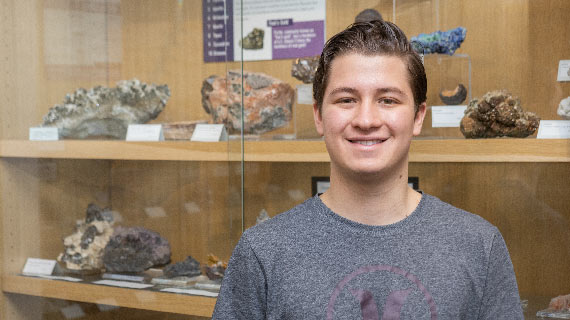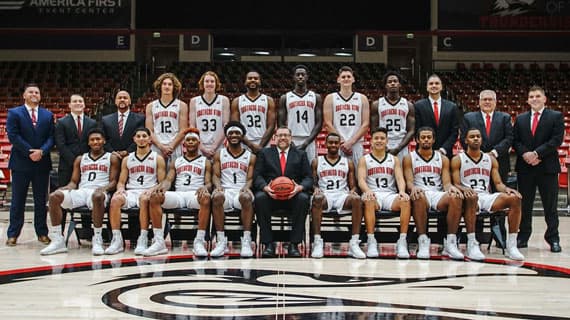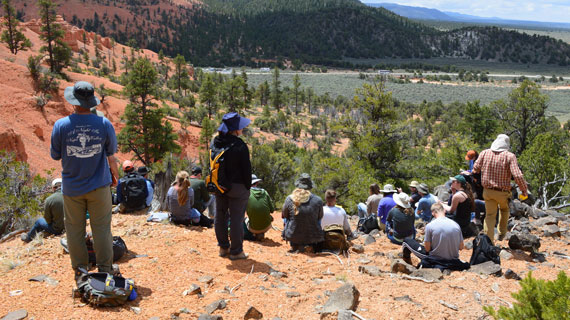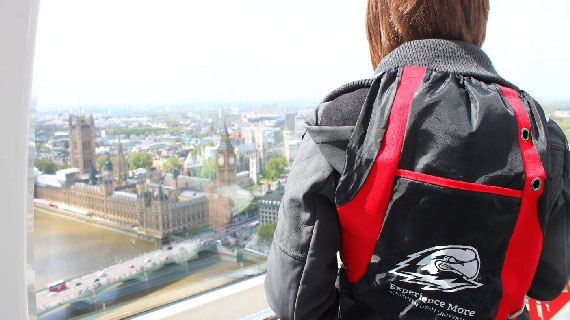From Ecuador to SUU: A Video-Call Changes Life of a Young Geologist
Posted: January 15, 2020 | Author: Tiago Rodrigues da Costa | Read Time: 5 minutes
 When it comes to having fun during childhood, toys usually fulfill most children’s dreams. However, for some like Southern Utah University freshman Raffaelle Verduga, rocks were all he needed. While growing up in Guayaquil, Ecuador, Verduga was always outside and his favorite activities were looking for insects, rocks and even gold in his backyard.
When it comes to having fun during childhood, toys usually fulfill most children’s dreams. However, for some like Southern Utah University freshman Raffaelle Verduga, rocks were all he needed. While growing up in Guayaquil, Ecuador, Verduga was always outside and his favorite activities were looking for insects, rocks and even gold in his backyard.
For that reason, his mother always advised him to consider geology as a profession, and that stuck with him. Later in life, when his desire to study in the United States matched his passion for geology, Verduga began considering options in Colorado and Utah. When a connection between an SUU’s agent in Ecuador and SUU’s Director for Central & South America Kendall Wilkey facilitated the process in a unique way and a video-call closed the deal.
“My first option was Colorado School of Mines,” Verduga said. “But I was lost. I didn’t know what to do. When I did the video-call with Kendall, he showed me the new Geoscience building at SUU. After that, Kendall gave me the opportunity to talk to a geology professor. Since I’m young, I have a passion for rocks, mining, petroleum, gas, oil, but I didn’t know much about what I had to learn in geology. The professor gave me a better perspective of what the life of a geologist is.”
A video call may seem like an untraditional method for many, but for Wilkey, technology is truly important in recruiting and connecting to new students at SUU. Apps and smartphones allow Wilkey to be creative and personal and to respond to doubts or uncertainties in the moment.
“We set up a quick meeting on Skype and got to know Raffaele,” Wilkey said. “At the same time, I was connected to Professor Jason Kaiser, thinking that would be a little bit more insightful for Raffaelle to speak with an actual professor from the Geology Department. Jason said one thing that I think it really hit with Raffaele. He said, ‘If you can go to School of Mines, go! It’s a fantastic program. However, no matter where you go in the nation, you’re going to end up needing to come to Utah because of our geological diversity.’”
Geology is wonderful to study, but it's hard to see. In many ways, it’s hard to have a sense of scale and length of time just by showing pictures or graphs in class. But in Southern Utah, the geological record is well exposed and well preserved. When geology students go out once per week on field trips to see and analyze records, they drive through millions of years of history.
“You can walk through time just by walking up Coal Creek,” said Dr. Jason Kaiser, assistant professor of geology. “It’s perfectly preserved, and it tells a very complex, but accessible story. Geologically, there’s a lot going on, but it’s easier to pick it apart, it’s easier to see each of the events happening. That is rare, because things erode, they break down, they move. And we can walk a mile from campus and see that. Utah’s the best place in the country to learn geology.”
National parks like Zion, Bryce Canyon, Capitol Reef, Arches or Canyonlands are a few hours distance, and SUU, as the University of the Parks, is devoted to promoting those experiences to students. That’s one of the reasons why Verduga came to Cedar City and became a T-Bird. For Verduga, being in Southern Utah and studying at SUU is a dream come true.
“Cedar City is a unique place,” Verduga said. “For me, all of this is new. The landscape, the desert, the red mountains. We don’t see that in Ecuador. Another thing I like is that it’s a small city, so I can focus more on studying, and I can walk to see my friends. Everything is near, which I think is perfect for a student. This city is perfect for me.”
Looking ahead in the future, Verduga wants to become a geologist and make a difference in the world. Professor Kaiser said, in the future, geology will most likely move away from the historical fossil fuel fields, and it’s going more toward fields like hydrology and environmental geology, which help develop sustainable practices. For Verduga, the topic of volcanoes is one that fascinates him the most, and he has a good reason: His home country.
“Geology is one of the most important careers in the world,” Verduga said. “We study earthquakes, and we can prevent disasters. In Ecuador, the most dangerous volcano is the Cotopaxi, located in Quito, the capital. One of my missions as a geologist is to try to help Ecuador, the society, to know the risk that a volcano can be for a city. Because they don’t know, they are living there and they don’t know they have a time bomb right in their backyard.”
At SUU, the International Affairs office has been investing more in the diversity of the student body, and that counts now with 63 different nationalities on campus. The purpose is to help the community get educated about the world. And it also gives an opportunity for American students to study abroad, which leads to the same result: broader knowledge about the world. Having Ecuadorian Raffaelle Verduga on campus is a wonderful opportunity for other students on campus to broaden their minds and know more about other cultures.
“I believe that education is the best practice of preventive medicine,” Wilkey said. “It’s an antidote to discrimination, which eventually can lead to the cure, which is empathy. Educating people more about whatever topic, whatever country, whatever culture, allows them to be more understanding. Having international students come to Cedar City, it’s an opportunity for our community to become more educated, which will then lead to us be a more accepting community, which will then lead us to be a more empathetic community.”
With students as its highest priority, the Southern Utah University Office of International Affairs fosters globally engaged communities by supporting the exchange of values, cultures, and ideas in an effort to advance a more just, empathic, and prosperous world.
This article was published more than 3 years ago and might contain outdated information or broken links. As a result, its accuracy cannot be guaranteed.
Tags: Geology Geosciences International Affairs



